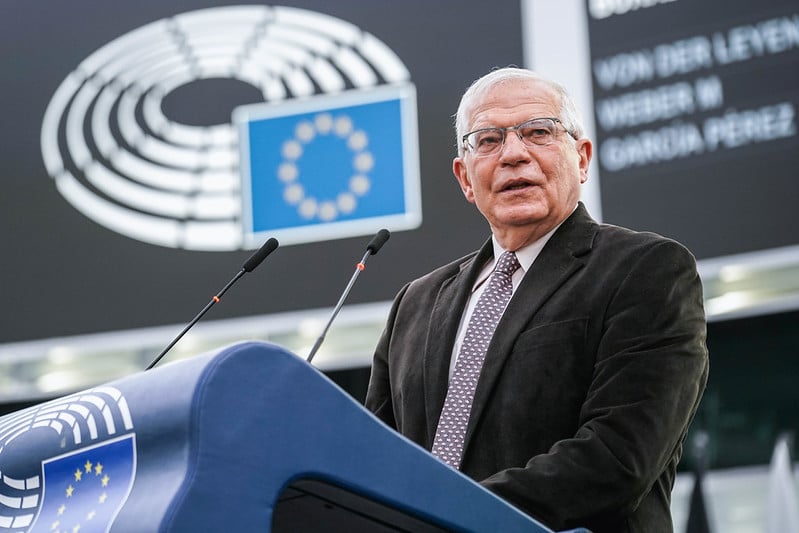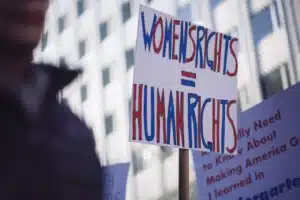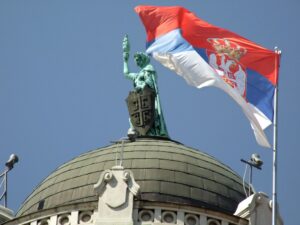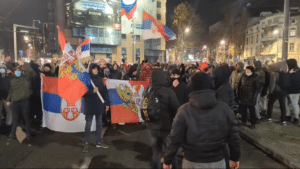Josep Borrell addressing the European Parliament, 2022 (Flickr)
After weeks of tension over license plates and the resignation of ethnic Serb officials, the leaders of Serbia and Kosovo reached an agreement to end their dispute over licence plates, according to the European Union’s top diplomat Josep Borrell.
On Wednesday 23rd of November, Kosovo and Serbia reached a deal on Wednesday to end a nearly two-year dispute over car licence plates in northern Kosovo, which the EU had feared could trigger ethnic violence.
Since Kosovo announced in June that it would no longer recognise license plates issued by Serbia and replace them with Kosovan ones, tensions have been mounting. About 10,000 ethnic Serbs in Kosovo (out of 120,000) have Serbian-issued car registrations.
Earlier talks failed in Brussels on Monday
The deal that has now been announced by Borrell appears to be similar to the agreement that the countries failed to reach on Monday. Josep Borrell (EU Foreign Policy Chief), Miroslav Lajčák (EU Special Representative of the Belgrade-Pristina Dialogue), Albin Kurti (Prime Minister of Kosovo) and Aleksandar Vučić (President of Serbia) met in Brussels on Monday the 21st to discuss tensions and find a solution, but talks failed at that time.
In the Monday proposal, Serbia was asked to stop issuing license plates to Serbs living in northern Kosovo, where this ethnic community is in the majority. Kosovo was requested to halt the process of re-registering current license plates. President Vučić agreed with the EU proposal.
Kurti, however, did not agree, calling the EU proposal unacceptable. He had expected that the proposal would be accompanied with a final agreement to normalise relations between Kosovo and Serbia. He accused Borrell of giving up on this goal.
Kurti’s disapproval led to great frustration with Borrell, who pointed to Kosovo as the culprit in the collapse of a deal: “For the sake of transparency I have to say we put forward a proposal that could have avoided this risky situation, which President Vučić accepted today, but Prime Minister Kurti did not.” Borrell noted that Kosovo in particular showed a “lack of respect for international legal obligations” and said he expects countries who’s ultimate objective is EU accession to act accordingly.
Kurti increases the pressure
A day after talks in Brussels broke down, Washington asked Kosovo on 22 November to postpone the introduction of fines for cars not complying with Kosovo’s re-registration. According to the original plan, police were to start handing out fines of up to €150 to cars with Serbian registration plates on 22 November at 08:00AM. Kurti, however, accepted Washington’s request and postponed the implementation by 48 hours. In a tweeted response to the request, Kurti said: “I am happy to work with the US and the EU to find a solution during the next two days.”
Kurti pushing for a more structural approach to actually achieve normalisation of relations between Serbia and Kosovo can be viewed as a means of putting pressure on the EU to make rapid progress in the Kosovo-Serbia talks, in which long-standing issues need to be resolved quickly.
“We have a deal”
This postponement has now led to results: “We have a deal,” Josep Borrell tweeted on Wednesday.
The explosive license plate dispute, of course, goes deeper than a technical bureaucratic adjustment. Borrell stressed that the current agreement is an important achievement, but that it is only the start of further negotiations. He will now invite both parties in the coming days to discuss an EU proposal, supported also by France and Germany, that will allow the two countries “to fully concentrate on the proposal on normalisation of their relations.”
Authors: Mathieu Neelen & Jarne van der Poel
Sources: AlJazeera, BalkanInsight1, BalkanInsight2, DeutscheWelle, Reuters, RTE
Photo: Flickr



